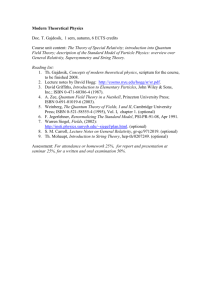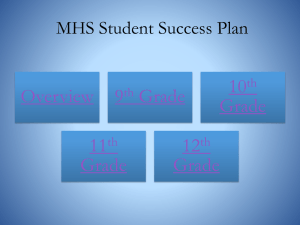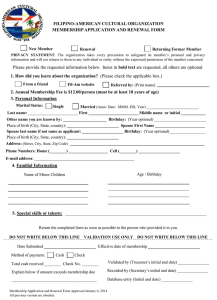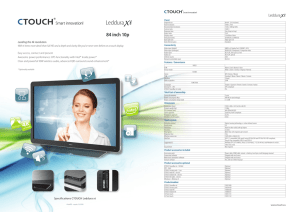docx - Shoreline Community College
advertisement
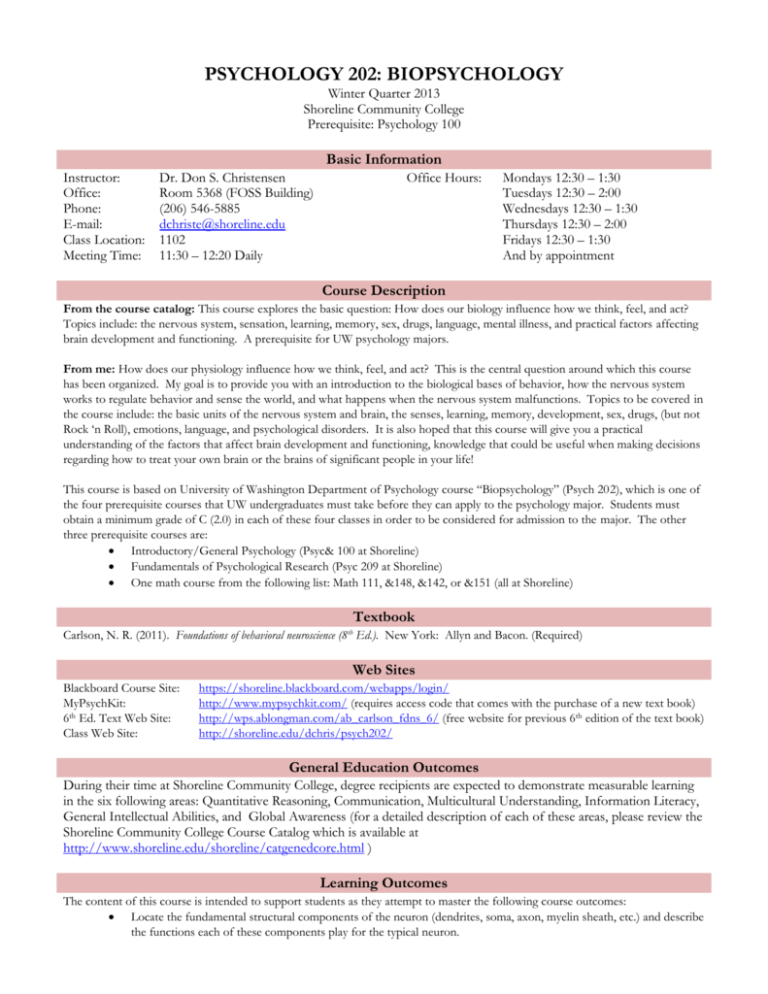
PSYCHOLOGY 202: BIOPSYCHOLOGY Winter Quarter 2013 Shoreline Community College Prerequisite: Psychology 100 Basic Information Instructor: Office: Phone: E-mail: Class Location: Meeting Time: Dr. Don S. Christensen Room 5368 (FOSS Building) (206) 546-5885 dchriste@shoreline.edu 1102 11:30 – 12:20 Daily Office Hours: Mondays 12:30 – 1:30 Tuesdays 12:30 – 2:00 Wednesdays 12:30 – 1:30 Thursdays 12:30 – 2:00 Fridays 12:30 – 1:30 And by appointment Course Description From the course catalog: This course explores the basic question: How does our biology influence how we think, feel, and act? Topics include: the nervous system, sensation, learning, memory, sex, drugs, language, mental illness, and practical factors affecting brain development and functioning. A prerequisite for UW psychology majors. From me: How does our physiology influence how we think, feel, and act? This is the central question around which this course has been organized. My goal is to provide you with an introduction to the biological bases of behavior, how the nervous system works to regulate behavior and sense the world, and what happens when the nervous system malfunctions. Topics to be covered in the course include: the basic units of the nervous system and brain, the senses, learning, memory, development, sex, drugs, (but not Rock ‘n Roll), emotions, language, and psychological disorders. It is also hoped that this course will give you a practical understanding of the factors that affect brain development and functioning, knowledge that could be useful when making decisions regarding how to treat your own brain or the brains of significant people in your life! This course is based on University of Washington Department of Psychology course “Biopsychology” (Psych 202), which is one of the four prerequisite courses that UW undergraduates must take before they can apply to the psychology major. Students must obtain a minimum grade of C (2.0) in each of these four classes in order to be considered for admission to the major. The other three prerequisite courses are: Introductory/General Psychology (Psyc& 100 at Shoreline) Fundamentals of Psychological Research (Psyc 209 at Shoreline) One math course from the following list: Math 111, &148, &142, or &151 (all at Shoreline) Textbook th Carlson, N. R. (2011). Foundations of behavioral neuroscience (8 Ed.). New York: Allyn and Bacon. (Required) Web Sites Blackboard Course Site: MyPsychKit: 6th Ed. Text Web Site: Class Web Site: https://shoreline.blackboard.com/webapps/login/ http://www.mypsychkit.com/ (requires access code that comes with the purchase of a new text book) http://wps.ablongman.com/ab_carlson_fdns_6/ (free website for previous 6th edition of the text book) http://shoreline.edu/dchris/psych202/ General Education Outcomes During their time at Shoreline Community College, degree recipients are expected to demonstrate measurable learning in the six following areas: Quantitative Reasoning, Communication, Multicultural Understanding, Information Literacy, General Intellectual Abilities, and Global Awareness (for a detailed description of each of these areas, please review the Shoreline Community College Course Catalog which is available at http://www.shoreline.edu/shoreline/catgenedcore.html ) Learning Outcomes The content of this course is intended to support students as they attempt to master the following course outcomes: Locate the fundamental structural components of the neuron (dendrites, soma, axon, myelin sheath, etc.) and describe the functions each of these components play for the typical neuron. Explain the basic electrical and chemical aspects of neural communication, emphasizing the following concepts: resting potential, action potential, depolarization, hyperpolarization, metabotropic receptors, ionotropic receptors, and synaptic transmission. Describe the basic principles of psychopharmacology such as psychokinetics, tolerance, withdrawal, and placebo effects; use knowledge of the neural communication process to discuss how various psychoactive substances can alter this process and subsequently alter behavior. Identify and describe the functions of the fundamental structures of the nervous system, emphasizing at least the major divisions of the brain. Locate and explain the roles of the key structures and pathways in the visual system, including the basic structures of the human eye and the retino-geniculo-cortical pathway. Describe and summarize the biological processes associated with learning and memory, emphasizing in particular neuroplasticity, long term potentiation, and the NMDA receptor. Describe the various brain structures associated with human language processing and explain the functions each of these areas; identify the symptoms of major aphasias (such as Broca’s aphasia and Wernicke’s aphasia) and recognize how the symptoms of aphasias can be used to illustrate typical language functioning. Identify the essential diagnostic criteria for psychological disorders such as schizophrenia, major depressive disorder, or substance dependence. Discuss and critique theories regarding biological/genetic factors associated with these disorders. Grading Exams: There are five total formal tests in the course: 4 regular exams and an optional final. Each test is worth 50 points. I will look at your 4 best test scores for the purpose of determining your grade. If you are satisfied with your performance after completing the 4th exam (Exam 4), you can skip the optional final. Students may choose to take the optional final (also worth 50 points) as an attempt to improve their lowest regular exam score. In-Class Cooperative Extra Credit: Shortly after each of the exams, students will be allowed to go over and correct the 25 multiple-choice and true false questions from the exam they just took. Students may use their notes and/or textbooks and are encouraged to collaborate and check answers with fellow classmates. Each individual student will submit a brand new Scan-Tron form. If a student submits a perfect (25/25) new answer sheet, the student will have two extra credit points added to his or her exam total. Any incorrect answers on the resubmission will be subtracted from the 2 possible bonus points but students will not have points taken away from their total exam score if they miss more than two answers. Written Assignments: There will be two writing opportunities in this class. Each of these assignments will ask you to find and read an article concerning a current issue in biopsychology. For each article, you will be asked to read, summarize, and personally react to it. Your paper should be between two and three pages in length. Each writing assignment is worth a maximum of 20 points. Optional Assignments: This class is rather heavy in exams. While I test regularly in order to keep the content students need to learn for an exam more manageable, some students are not particularly thrilled at having most of their grade determined by exam performance. In attempt to address this possible concern, some optional assignments have been created. Students choosing to submit these optional assignments will reduce the overall influence of their exam scores on their final grade. There are two types of optional assignments: reaction papers and on-line multiple-choice test submissions. Reaction papers: Approximately every two weeks, students may write a short a paper on an article addressing some aspect of biopsychology. Students may choose from a list of potential articles that are available through the course web site (click on the “Assignments” link at http://shoreline.edu/dchriste/psych202/). Students electing to do a reaction paper are asked write a short 23 page paper that includes the following (Note: these papers are similar to the assigned research papers that are required of all students): 1. A brief summary of the article. Write a 1-2 paragraph summary of the article. Don’t go into extensive detail. Just write something that indicates to me that you in fact read it. 2. Your personal reaction to what you read. This is an open-ended part of the paper where you can share what ever you like, as long as it related to the topic of the article. Did you agree or disagree with its conclusions? Can you relate the material to the class or your life in any way? These papers are worth 5 points each (Please see the front pages of the syllabus for due dates). Student may submit as few as one or as many as four reaction papers over the course of the quarter (a maximum of 20 points is possible). Papers are to be turned in on the due dates and late papers will not be accepted except in rare circumstances. Thus, students will not be able to hand in several reaction papers at the end of the quarter in order to “save their grade” so please plan ahead of you’d like to submit these optional assignments. On-line multiple-choice test submissions: MyPsychKit ,which comes with the purchase of new texts, is an on-line set of resources that students can use to help them master the content presented in the book. For students who don’t purchase the book new, a similar though less comprehensive set of resources are available on a website for a previous version of our book (http://wps.ablongman.com/ab_carlson_fdns_6 ). On each of these sites, for each chapter, are lists of multiple-choice Practice Tests which you can take. After completing a test, you get feedback showing how you did. You are also given the option of emailing your results to someone. For this set of optional assignments, students can complete a set of multiple-choice questions with all the answers correct and then either email (dchriste@shoreline.edu) or submit a printed copy of their results to me. In order to receive full credit, all answers must be correct (15/15 or 24/24). For on-line submissions, be sure to include your name or else I won’t know who sent me the results. For each answer wrong on a submitted assignment, two points will be deducted. If you get answers wrong on a test the first time, simply do the test again and only submit/print it when all of the answers are right. Students may submit as few as one or as many as four online multiple choice test submissions (a maximum of 20 points is possible). Submissions are to be received by email or turned in on the due dates by the end of class time that day. Late submissions will not be accepted except in rare circumstances. Students will not be able to hand in several submissions at the end of the quarter in order to “save their grade” so please plan ahead of you’d like to submit these optional assignments. Students are responsible for typing in the proper email address to insure that their tests results actually reach me. Completed on-line tests that fail to reach me by the due date because the email address is incorrect will not be accepted late. These practice exams are worth 4 points each (Please see the front pages of the syllabus for due dates). Student may submit as few as one or as many as four tests over the course of the quarter (a maximum of 16 points is possible). Tests are to be turned in by the end of class on the date due and tests received any time after class will not be accepted. Thus, students will not be able to hand in several tests at the end of the quarter in order to “save their grade” so please plan ahead of you’d like to submit these optional assignments. Optional Multiple-Choice Test Assignments (Please see the front pages of the syllabus for due dates): On-line Multiple Choice Submission #1: Chapter 2, Chapter 3, or Chapter 4 On-line Multiple Choice Submission #2: Chapter 6, Chapter 8, or Chapter 9 On-line Multiple Choice Submission #3: Chapter 11, Chapter 12 or Chapter 13 On-line Multiple Choice Submission #4: Chapter 15 or Chapter 16 Course Grade and Grading Scale: The final grade you receive for the course will be based on the number of points you earn form your exams, extra credit summaries, and final. The maximum number of points possible for the class varies between 265 and 315, depending on how many optional assignments you turn in. There is no automatic curve grading. Listed below is the grading scale that I will use to assign final course grades. If you achieve a given point total, then your course grade cannot be any lower than the grade on the scale. If the grade distribution using this scale comes out such that less than 50% of the class receives a final grade of 2.5 or above, then I will adjust the scale until 50% of the class has a grade of at least 2.5. I am including the grading scale in this syllabus so that you will know exactly how well you have to do in order to receive a particular final grade. GRADING SCALE Percentage 96% 94% 92% 90% 89% 88% 87% 86% 85% 84% 83% 82% Grade 4.0 (A) 3.9 3.8 3.7 3.6 3.5 3.4 3.3 3.2 3.1 3.0 (B) 2.9 Percentage 81% 80% 79% 78% 77% 76% 75% 74% 73% 72% 71% 70% Grade 2.8 2.7 2.6 2.5 2.4 2.3 2.2 2.1 2.0 (C) 1.9 1.8 1.7 Percentage 69% 68% 67% 66% 65% 64% 60% Below 60% Grade 1.6 1.5 1.4 1.3 1.2 1.1 1.0 (D) 0.0 (F) Appeal Procedure: If your answer to an exam question is marked as being incorrect but you feel that it is correct, then you should write a justification as to why you feel it is correct based upon the material presented in the textbook or in class. In other words, don't merely state your personal opinion; rather, specifically justify your answer based on course material. Any appeals should be handed in to me within 1 week after the official exam grades are posted. I will review your appeal and if I think it justifies your answer, you will receive credit. Incompletes and Make-ups: If you feel that you are unable to complete all the coursework this quarter you must see me in advance so that I can decide whether to assign a grade of incomplete. As a rule, incompletes must be made up by the end of the following quarter. Please be aware that I probably will not be teaching this course again during the following quarter. Thus, depending on your circumstances, you may have to complete the course with another professor. Similarly, if justifiable and uncontrollable circumstances will prevent you from taking a quiz or exam at the scheduled time, see me in advance sothat we can discuss the possibility of a make-up exam. Exam/Homework Ethics: These remarks aren’t meant to offend anyone’s sense of honesty, but I believe it’s best to discuss ethics up front. It is the official policy of Shoreline Community College that cheating, plagiarism, fabrication, and other forms of academic misconduct are grounds for disciplinary action. Cheating is an act of deception by which a student misrepresents that he or she has mastered information on an academic exercise which in fact has not been mastered. Examples of cheating include such things as looking at other students’ exams, using notes during an exam, submitting the exact same or very similar work as another student, or receiving unauthorized outside assistance. Plagiarism is the inclusion of someone else’s words, ideas, or data as one’s own work. Examples of plagiarism include such things as copying sentences from texts or the Internet. Ways to avoid plagiarism are to use quotation marks when including other people’s actual words in your papers and to properly acknowledge the source(s) of your information. It is also extremely helpful to use your own words when writing a paper. If cheating or plagiarism occurs, a grade of zero will be given for that piece of work. I will also notify the appropriate administrative official and disciplinary action may follow. Cheating and plagiarism are both serious offenses that can have substantial consequences, including being expelled from school so I strongly encourage you to be aware of and avoid these potential student conduct problems. (The following paragraph is from the SCC Student Guide, page 29) College Policy 5030, the Student Code of Conduct and Discipline, outlines general expectations for student behavior and procedures for resolving issues of student conduct and discipline. College Policy 5033, Dishonesty in Academics, describes behavior that is unacceptable in the classroom and procedures for resolving situations involving academic dishonesty. College Policy 5035, Student Grievance Procedures—Academic Evaluation, provides procedures for resolving disputes that arise between students and faculty members regarding grades. A complete list of student standards of conduct, as well as campus rules and procedures, is printed in the College Policy Manual, which is available in the Ray W. Howard Library/Media Center, the Student Programs Office, the Student Government Office and other administrative offices. Final Thoughts on Grading: Grades in this course will be based solely on the system and scale discussed above. Aside from the extra credit summaries, there will be no possibility of doing additional "extra" reports, papers, etc., to raise your grade. So please, don't ask. If you are having trouble with the course material or aren't doing as well on the exams as you think you should be, please come talk to me. Don't wait until the end of the quarter. I am here to help you learn. School Closure & Unplanned Instructor Absences If I am forced to personally miss a day of class or the campus is closed due to inclement weather, such as snow, I will attempt to continue class by making use of the distance learning technologies Blackboard and Tegrity. On days when this happens, please check the class website and Blackboard for instructions on continuing class assignments and readings. So, even if I am not physically on campus or the campus is closed, class will likely continue and students will be expected to continue with the assigned work of the class. Student Email Beginning Feb. 11 Shoreline will be requiring all students to have a go.shoreline email account in order to facilitate the reliability of student-professor, student-student, and student-college emails. This class and the College will use these accounts exclusively for email communication. Students are expected to check their accounts on a regular basis. Students using other email accounts to submit assignments may not use email delivery issues as an excuse for late/missed assignments. Please go to http://shoreline.edu/email for instructions on how to activate student email. Additional Campus Resources Some campus resources you may wish to utilize are The Writing and Learning Studio (206 546-4308, Room 1501) and Services for Students with Disabilities Program (206 546-5832, TDD 206 546-4520, FOSS Building, Room 5241). If you are a student with a disability and believe you are entitled to accommodations on exams and homework assignments or to particular services such as note taking, I need a formal letter from the Services for Students with Disabilities office in order to honor your request(s). Students are responsible for contacting this office themselves. Topics & Reading Assignments Exam 1 (1/7-1/25) Exam 2 (1/28-2/11) Exam 3 (2/12-3/1) Exam 4 (3/4-3/22) Topics Assignments Introduction Cells of the Nervous System Structures of the Nervous System Psychopharmacology Read Syllabus Read Carlson Chapters 1 (pp. 1-10), 2, 3 (pp. 56-78), & 4 (pp. 88-113) Read optional reaction paper #1 article Write optional reaction paper #1 Complete syllabus quiz Complete optional online multiple-choice quiz #1 Take Exam 1 Complete Exam 1 In-Class Cooperative Extra Credit Session Visual System Sleep Reproductive Behaviors Read Carlson Chapters 6, 8, & 9 Read optional reaction paper #2 article Write research paper #1 Write optional reaction paper #2 Complete optional online multiple-choice quiz #2 Take Exam 2 Complete Exam 2 In-Class Cooperative Extra Credit Session Ingestive Behaviors Learning & Memory Language & Communication Read Carlson Chapters 11, 12, & 13 Read optional reaction paper #3 article Write optional reaction paper #3 Complete optional online multiple-choice quiz #3 Take Exam 3 Complete Exam 3 In-Class Cooperative Extra Credit Session Schizophrenia Mood Disorders Substance-related Disorders Read Carlson Chapters 15 (pp. 444-467) & 16 (pp. 477 (Prologue), 490-508) Read optional reaction paper #4 article Write research paper #2 Write optional reaction paper #4 Complete optional online multiple-choice quiz #4 Take Exam 4 Complete Exam 4 In-Class Cooperative Extra Credit Session Tentative Course Calendar Week Winter 2013 Monday Tuesday 1 January 7-11 Read Chapter 1 (pp. 110) 2 January 14-18 Optional Reaction Paper #1 Due 3 January 21-25 MLK HOLIDAY NO CLASS 4 January 28 – February 1 5 February 4-8 6 February 1115 Read Chapter 6 Optional Reaction Paper #2 Due Read Chapter 9 Research Paper #1 Due Exam 2 Cooperative Extra Credit Session 7 February 1822 PRESIDENT’S DAY NO CLASS 8 February 25 – March 1 9 March 4-8 Optional Reaction Paper #4 Due Read Chapter 15 (pp. 442-455) 10 March 11-15 Research Paper #2 Due Read Chapter 15 (pp. 455-467) 11 March 18-22 Exam 4 On-line MC test #4 Due (before class) Wednesday Thursday Read Chapter 2 Read Chapter 3 (pp. 56-78) Read Chapter 4 (pp. 99-113) Read Chapter 4 (pp. 88-98) Exam 1 On-line MC test #1 Due (before class) Reach Chapter 8 Exam 1 Cooperative Extra Credit Session Exam 2 On-line MC test #2 Due (before class) Read Chapter 12 Read Chapter 11 Optional Reaction Paper #3 Due Friday Read Chapter 13 Exam 3 On-line MC test #3 Due (before class) Read Chapter 16 (477, 490-508) Optional Final (11:30)




